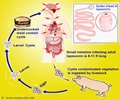A researcher said that, an Australia-led study has identified a gene associated with a common form of epilepsy which could lead to earlier diagnosis.

"The reason that this discovery is very important is that it's not just for rare families, we think it will be a gene that will be important for people without a family history," Scheffer told AFP.
"So it's changing the game in terms of being important for a much broader number of people with focal epilepsy."
Focal, or partial, seizures start in one part of the brain and affect the part of the body controlled by that part of the brain.
Scheffer said a clinical diagnosis could not be made for epilepsy without seizures of some kind but the finding could aid genetic counselling and diagnosis -- particularly in cases where everything else in the brain is normal.
"When you have epilepsy people always say, 'Why have I got this?' And this is the next level, which is the gene test," she said.
"And it's also important in terms of genetic counselling for their own children," she said, meaning people would be able to assess the risk for their own offspring if they were found to have the gene.
"That's huge to find a gene that picks up 12 percent, 12 percent of the common cause of epilepsy," Scheffer said.
"I think that it means that if you look at anybody with focal epilepsy -- without an abnormality on their MRIs, what we call a structural abnormality -- my guess is that it will be 2-4 percent of them will have this cause."
The research, published in the April issue of the journal Nature Genetics, also involved scientists in Europe and Canada.
Most of the families studied were Australian, but the group included some from Spain, Israel, Italy and elsewhere, Scheffer said.
Source-AFP
 MEDINDIA
MEDINDIA




 Email
Email










